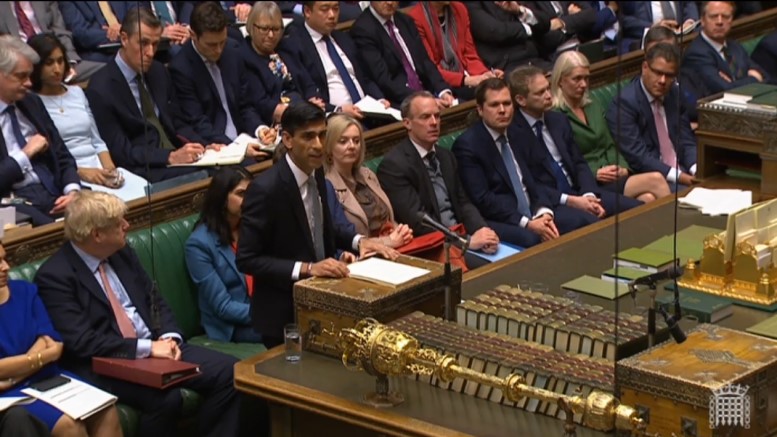
The measures announced in Chancellor of the Exchequer Rishi Sunak’s first budget were naturally overshadowed by the current coronavirus (COVID-19) outbreak. He announced a series of measures to protect workers, jobs, employers and the general population which he valued at £7 billion.
Because of the seriousness of the situation, he was well into his speech before he got onto other measures, including public investment. This he split into three sections:
Firstly, he plans to move many government jobs out of London and distribute them around the country. A new economic campus in the North will take 750 staff from the Treasury, and the departments for business, local government and trade. His ultimate ambition is to move 22,000 civil servants outside central London.
Secondly, the government will invest in the regions, partly because of this change in ‘mindset’ as he termed it, The Budget provided an extra £640 million for the Scottish Government, £360 million for the Welsh Government, and £210 million for the Northern Ireland Executive, as well as £242 million of funding for new City and Growth Deals, taking the total investment in these deals to more than £2.7 billion.

Thirdly, the Chancellor is going to fund the building of broadband, railway, roads.“If the country needs it, we will build it,” he stated.
On broadband, he promised £5 billion to get gigabit-capable broadband into the hardest to reach places and £510 million of new investment into the shared rural mobile phone network, which means that, in the next five years, 4G coverage will reach 95 per cent of the country.

Chancellor of the Exchequer.
He then said: “We’re also going to build better railways: with spades going in the ground on HS2, our commitment to fund the Manchester-Leeds leg of the Northern Powerhouse Rail, funding today for a new station at Cambridge South and the Midlands Rail Hub, Darlington station moving to the next stage of development and approval, and funding to make a dozen train stations more accessible.”
That left roads, for which he is setting up “a new £2.5 billion pothole fund – that’s £500 million every single year; enough to fill, by the end of the Parliament, 50 million potholes.”
But there will be other new roads too – £27 billion of new strategic roads by the ned of the parliament.
So, the rail section of the Chancellor’s speech wasn’t very long, and much had already been announced, but it did seem like the government is committed to a rail expansion programme.
Response
Unsurprisingly, there were a number of quick reactions to the budget announcement. First to reach the Rail Insider offices was from Darren Caplan, chief executive of the Railway Industry Association.

Railway Industry Association.
“It has been a particularly difficult time for this Budget,” he stated, “with coronavirus rightly being the Government’s number one priority. Looking to the long term, though, it is clearly welcome that Chancellor Rishi Sunak has re-committed the Government to infrastructure spending and rail investment, including backing major projects like Midlands Rail Hub, HS2, Northern Powerhouse Rail and others. We also look forward to seeing the upcoming National Infrastructure Strategy, which we encourage the Government to publish as soon as possible.
“From the railway industry’s perspective, rail suppliers are excited and ready to deliver this ambitious programme of investment to ‘level-up’ opportunities and unlock the full potential of UK rail. However, as we set out in our submission to the Budget last month, there are five ‘crunch points’ which could act as a barrier and hamper the sector’s ability to deliver the world class railway everyone would like to see.
“These ‘crunch points’ are renewals, rolling stock, enhancements, decarbonisation and digitalisation. Investment in each of these areas can be characterised in terms of ‘boom and bust’, with some not ramping up until the middle of the 2020s meaning a real shortfall in the next five years, when rail businesses need to be boosting capabilities and investing in people to deliver.
“So we urge the Government to work with the Railway Industry Association and our members to find solutions to these crunch points – for example, by bringing work forward from CP7 into CP6 – and to smooth out ‘boom and bust’ investment so that we can continue to develop customer-focused rail in the UK and to increase UK plc’s offer abroad.”

Midlands Connect chairman Sir John Peace was only marginally slower out of the starting blocks. He commented on the additional £20 million awarded to Midlands Connect’s flagship Midlands Rail Hub, meaning the project can move to the next stage of development, an Outline Business Case (OBC), which will include detailed design, planning and costings.
“This funding pledge is a firm vote of confidence from the government that it is committed to delivering the Midlands Rail Hub, an investment that will spearhead an infrastructure revolution and level up the economy,” Sir John said.
“We believe in the potential of our proposals to revolutionise the region’s rail network; it means more services, faster journeys and less overcrowding for passengers across the Midlands and beyond. We must now work at pace with the government to make sure that passengers begin to see improvements to their rail journeys as soon as possible.
“Today’s Budget is a positive step towards the government’s commitment to levelling up the economy, ensuring the Midlands Engine is at the heart of the UK’s future prosperity.”

Potholes
Harry Pearl, CEO of Roadmender Asphalt, a company which makes materials to fill potholes, was naturally delighted! “The budget lays out an exciting programme for levelling up Britain’s businesses and infrastructure,” he stated.
“The pothole fund offers a fantastic opportunity to implement new technologies that allow us to repair roads far quicker than before. This will reduce the time of disruption for road users, as well as proving to be the cheaper and move environmentally friendly option.”

Campaign for Better Transport.
The Campaign for Better Transport also focussed on potholes, welcoming the £1 billion investment in green transport solutions and commenting that “the long overdue money to repair potholes is also welcome; the poor state of local roads is an ongoing issue and cause of concern to all road users”.
No comment was made on the level of rail investment, though the fact that train fares continue to rise attracted some attention.
Available skills
The spending on infrastructure as a whole, both rail and road, drew comments about the availability of skills. Martin Hottass, managing director of technical training at City & Guilds, said: “It is reassuring to see from today’s Budget that the government is taking steps to progress critical infrastructure projects.

“However, the government must ensure that there are plans in place to address the skills crisis we are facing in the infrastructure sector. We hope to see this addressed in the National Infrastructure Strategy which will be published later this year.
“With a number of large-scale projects on the horizon for UK infrastructure, from HS2 to Northern Powerhouse Rail, as well as several projects to increase green energy and upgrade crumbling railway infrastructure in the North of England, we need to significantly increase the amount of talent coming into the industry or we won’t have the workforce needed to deliver these ambitious plans.
“We are already facing a skills crisis in the sector, according to data from Energy & Utility Skills published earlier this year, 26 per cent of the 800,000 unfilled vacancies in the sector are down to skills shortages. It is critical that the government acts now to upskill a new generation of much needed skilled engineers and technicians.
“Against a backdrop of low unemployment in the UK and with Brexit and more stringent immigration control on the horizon, it is essential that we look to the millions of underutilised people that were identified in our recent research Missing Millions. By retraining people in badly paid insecure work or in careers at risk of automation, as well as opening up opportunities for people with caring responsibilities, we can not only fill skills gaps but also significantly improve social mobility in the country.
“Only by directing sufficient funds and investing in improvements to existing adult education policy will we be able to stem the growing skills gaps and direct necessary labour into a sector that’s crying out for skilled talent.”

Rhys Harris, associate director of engineering, process and construction at recruitment experts Morson Group, was also concerned about skills: “Infrastructure spending was a real centrepiece of today’s Budget as the Chancellor laid out his commitment to unlocking construction and innovation throughout the country.
“But to get Britain building and unleash the economy’s true potential, it is crucial that we have access to the right talent at all levels to ensure that businesses and their supply chains can attract and retain the right skillsets as and when they need them.
“Skills are the biggest barrier to us delivering on this ambition. Therefore, government, businesses, education providers and talent solution specialists like ourselves must form strategic partnerships to create short and long-term skills frameworks and action plans – be it technical apprenticeships, upskilling, reskilling and attracting talent from overseas – that ultimately build active and agile talent pools that are the backbone of every healthy economy.”
Union view

Predictably, the trade union movement was not too happy with a Conservative budget. TSSA general secretary Manuel Cortes commented “Far from being a ‘getting things done’ Budget, this amounts to a ‘ten wasted years’ Budget. The Tories like to make grand claims, but people won’t be fooled for a minute.
“Frankly, the only things they have got done since 2010 is to strip away vital public funds across the board and hurt millions of people in the process.
“What the Tories’ new-found love of public services shows is that all the public spending measures announced today were always possible – and that austerity was an ideological choice, none of which was necessary.
“The claim made by Sunak that the Tories are the party of the workers is beyond parody and nothing highlights his smoke and mirrors more than the claim that Londoners have benefited ‘from a long-term transport deal that helped TfL’. The truth is Transport for London has lost its £700m operating grant and this should be reinstated without delay.
“The Chancellor barely mentioned our railways and in fact seemed pleased as punch about a whole raft of measures encouraging travel by road – hardly what we need in a climate crisis.
“As ever the devil will be in the detail of this Budget, but I wouldn’t trust a Tory Chancellor as far as I could throw one.”


Be the first to comment